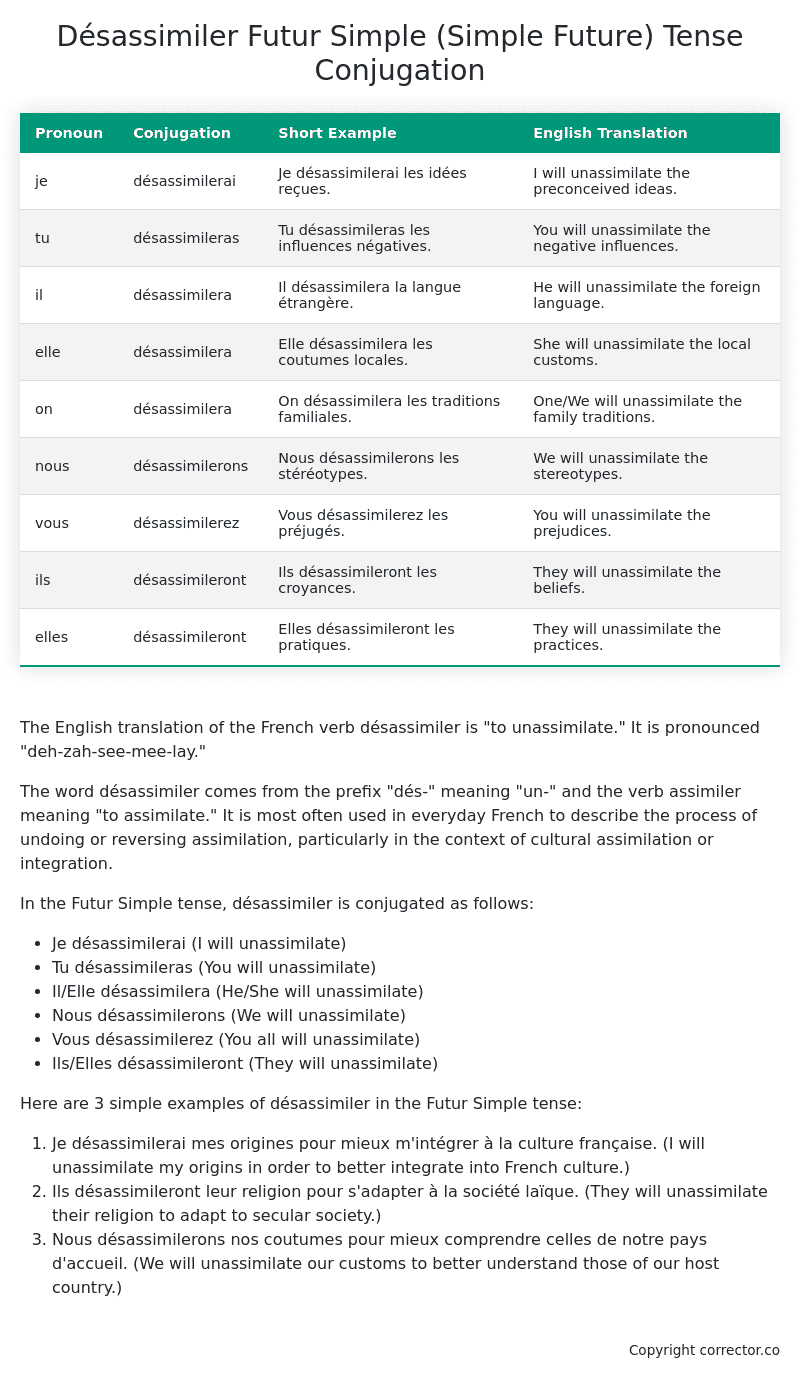Futur Simple (Simple Future) Tense Conjugation of the French Verb désassimiler
Introduction to the verb désassimiler
The English translation of the French verb désassimiler is “to unassimilate.” It is pronounced “deh-zah-see-mee-lay.”
The word désassimiler comes from the prefix “dés-” meaning “un-” and the verb assimiler meaning “to assimilate.” It is most often used in everyday French to describe the process of undoing or reversing assimilation, particularly in the context of cultural assimilation or integration.
In the Futur Simple tense, désassimiler is conjugated as follows:
- Je désassimilerai (I will unassimilate)
- Tu désassimileras (You will unassimilate)
- Il/Elle désassimilera (He/She will unassimilate)
- Nous désassimilerons (We will unassimilate)
- Vous désassimilerez (You all will unassimilate)
- Ils/Elles désassimileront (They will unassimilate)
Here are 3 simple examples of désassimiler in the Futur Simple tense:
- Je désassimilerai mes origines pour mieux m’intégrer à la culture française. (I will unassimilate my origins in order to better integrate into French culture.)
- Ils désassimileront leur religion pour s’adapter à la société laïque. (They will unassimilate their religion to adapt to secular society.)
- Nous désassimilerons nos coutumes pour mieux comprendre celles de notre pays d’accueil. (We will unassimilate our customs to better understand those of our host country.)
Table of the Futur Simple (Simple Future) Tense Conjugation of désassimiler
| Pronoun | Conjugation | Short Example | English Translation |
|---|---|---|---|
| je | désassimilerai | Je désassimilerai les idées reçues. | I will unassimilate the preconceived ideas. |
| tu | désassimileras | Tu désassimileras les influences négatives. | You will unassimilate the negative influences. |
| il | désassimilera | Il désassimilera la langue étrangère. | He will unassimilate the foreign language. |
| elle | désassimilera | Elle désassimilera les coutumes locales. | She will unassimilate the local customs. |
| on | désassimilera | On désassimilera les traditions familiales. | One/We will unassimilate the family traditions. |
| nous | désassimilerons | Nous désassimilerons les stéréotypes. | We will unassimilate the stereotypes. |
| vous | désassimilerez | Vous désassimilerez les préjugés. | You will unassimilate the prejudices. |
| ils | désassimileront | Ils désassimileront les croyances. | They will unassimilate the beliefs. |
| elles | désassimileront | Elles désassimileront les pratiques. | They will unassimilate the practices. |
Other Conjugations for Désassimiler.
Le Present (Present Tense) Conjugation of the French Verb désassimiler
Imparfait (Imperfect) Tense Conjugation of the French Verb désassimiler
Passé Simple (Simple Past) Tense Conjugation of the French Verb désassimiler
Passé Composé (Present Perfect) Tense Conjugation of the French Verb désassimiler
Futur Simple (Simple Future) Tense Conjugation of the French Verb désassimiler (this article)
Futur Proche (Near Future) Tense Conjugation of the French Verb désassimiler
Plus-que-parfait (Pluperfect) Tense Conjugation of the French Verb désassimiler
Passé Antérieur (Past Anterior) Tense Conjugation of the French Verb désassimiler
Futur Antérieur (Future Anterior) Tense Conjugation of the French Verb désassimiler
Subjonctif Présent (Subjunctive Present) Tense Conjugation of the French Verb désassimiler
Subjonctif Passé (Subjunctive Past) Tense Conjugation of the French Verb désassimiler
Subjonctif Imparfait (Subjunctive Imperfect) Tense Conjugation of the French Verb désassimiler
Conditionnel Présent (Conditional Present) Tense Conjugation of the French Verb désassimiler
Conditionnel Passé (Conditional Past) Tense Conjugation of the French Verb désassimiler
L’impératif Présent (Imperative Present) Tense Conjugation of the French Verb désassimiler
L’infinitif Présent (Infinitive Present) Tense Conjugation of the French Verb désassimiler
Struggling with French verbs or the language in general? Why not use our free French Grammar Checker – no registration required!
Get a FREE Download Study Sheet of this Conjugation 🔥
Simply right click the image below, click “save image” and get your free reference for the désassimiler Futur Simple tense conjugation!

Désassimiler – About the French Futur Simple (Simple Future) Tense
Formation of Futur Simple
For regular -er verbs (e.g., parler – to speak)
For regular -ir verbs (e.g., finir – to finish)
For regular -re verbs (e.g., vendre – to sell)
Common Everyday Usage Patterns
Conditional Statements
Interactions with Other Tenses
Futur Antérieur
Conditional
Present
Summary
I hope you enjoyed this article on the verb désassimiler. Still in a learning mood? Check out another TOTALLY random French verb conjugation!


